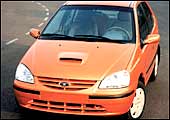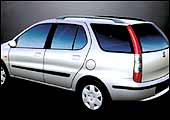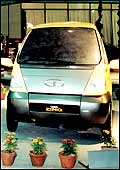 |
| Ratan Tata, Chairman, Tata Group: The
small car driver all the way |
This
must be the slowest lift of the century," grumbles Ratan Tata
as he makes his way into the Presidential Hall at the Taj President
hotel in Colaba, South Mumbai. For a man of punctilious manners,
it's an uncharacteristic remark. But it's easy to see why the non-executive
Chairman of the Rs 45,000-crore Tata Group, which incidentally owns
the hotel, is impatient. Cooped up inside the first-floor hall are
about 150 analysts, who've been invited for a pitch from Tata's
automotive company, Tata Engineering. Only the previous day, the
company wowed Dalal Street with a spectacular year-end performance.
Revenues are up 22 per cent to breach the Rs 10,000-crore mark again,
and previous year's red ink has turned into a thick black of Rs
300 crore.
But this is more than just an ordinary turnaround
for Tata. In many ways, it's a personal triumph. A vindication of
his own beliefs. Eight years ago when the 65-year-old Tata decided
to get truck-maker Tata Engineering to manufacture passengers cars-that
too at an investment of Rs 1,700 crore-critics pilloried the man.
An Indian company can never make its own passenger car, they declared.
But Tata persisted and when the first Indicas sputtered due to quality
problems, he returned with a vastly improved V2 that the market
liked.
 |
"This is the
first chapter in the relationship between Tata Engineering and
MG Rover"
V. Sumantran/Head (Passenger Car Business & Engineering
Research Centre/Tata Engineering |
Today, at half-past eight on a Wednesday morning,
he has the analysts all ear. Tata unveils his new vision for the
company. "I want Tata Engineering to be a truly global automobile
company, which spreads its wings by setting up operations abroad
and exporting vehicles to other countries," he declares. He
also talks about his other pet project: a Rs 1 lakh car that most
households in India can afford to buy. To the sceptics, Tata's message
is simple. "With the Indica, we have proved that we can deliver
what we promise," he says as a matter of fact.
Global Plans
The process of taking Tata Engineering global
has already started. In December 2002 the company entered into an
agreement with mg Rover, giving it access to 250 dealerships across
Europe. Although the British car-maker is ailing, particularly after
its separation from BMW, it stills offers an inroad into Europe
for Tata Engineering. Starting 2004, about a hundred thousand Indicas
(badged as Rover) are expected to be sold over the five years that
follow. Says V. Sumantran, Tata Engineering's head of passenger
car business and the engineering research centre: "This is
the first chapter in the relationship between the two companies.
We plan to share products and jointly develop car parts together."
There are also big plans for commercial vehicles,
which fetch 60 per cent of the company's revenues. One of them is
to make India an export hub for trucks and buses. An assembly plant
in Malaysia is planned as well. Recently, the company launched the
EX series of trucks in 15 towns in Sri Lanka. Simultaneously, it
is also exploring the Chinese market and is looking for buyers in
South Asia, Asean region, CIS countries, a couple of countries in
the Middle East, and three countries in Europe. "A Rover-like
tie up for CVs, though not on the anvil, cannot be ruled out,"
says Ravi Kant, head of commercial vehicles business.
|
New Cars In The Offing
|
 |
 |
Indica Sport
Launch: September 2003 |
Indigo Station Wagon
Launch: October 2003 |
New Sumo
Launch: Dec 2003-Jan 2004 |
New Indica
Launch: Dec 2003-Jan 2004 |
But what's closer to Tata's heart is the passenger
car business. Having made Tata Engineering the second biggest car-maker
in the country, he now wants it to have a go at market leader Maruti
Udyog, armed with a slew of new cars (See New Cars In The Offing).
These cars would largely be extensions of the Indica platform, but
Sumantran agrees that the company has to look beyond the Indica.
Will the small car pry open a huge untapped market? Some such cars
are available in various parts of the world, but as B.V.R. Subbu,
Hyundai Motor India's President points out, "It would be interesting
to see which model the Tatas pick that satisfies safety and emission
norms and meet the needs of the consumer."
If there's anybody in India who can make that
possible, then it is Sumantran. Prior to joining the Tatas in November
2001, Sumantran-who oversaw the launch of the company's successful
sedan, Indigo-was designing cars for General Motors in Detroit,
and specifically a small car. Says the man: "(A successful
small car) is the automotive Holy Grail. But that doesn't mean you
stop looking for it." Sumantran plans to configure the small
car outside India. And while Tata denies that any prototype has
been developed yet (See ''We Have All It Takes To Make The Rs 1-Lakh
Car''), he says that it can go from concept to production in less
time than it took the Indica. For example, the Indica took 33 months
in the making, but Indigo was out in 23. Says Sumantran: "We
are working towards shorter templates."
That could also be because Tata, who's the
non-executive chairman of the group, will step down in another four
years. And the car enthusiast Tata would like nothing more than
a revolutionary small car as his last hurrah.
| "We Have All It Takes To Make The Rs 1-Lakh
Car'' |
| Ratan Tata is wary of letting the
small car cat out of the bag, but has no doubts that the dream
will be realised. Excerpts from an interview:
Has Tata Engineering built prototypes of the small car?
No. We are not at the prototyping stage for this car. The
Rs 1 lakh car is at the concept stage. I do believe it should
be possible to achieve our objective, and Tata Engineering
has the combination of engineering skills, development capabilities
and the infrastructure to undertake this challenge.
Making cars is an expensive business. Will the car be
viable at this price?
We need to look at a different manufacturing strategy for
this car with more outsourcing, joint development and manufacturing
to make this pricing possible. There needs to be close participation,
co-operation between Tata Engineering, component/aggregate
manufacturers, and even other OEMs, for an industry-wide cost-effective
solution.
When will the car be launched?
It would be difficult to comment at this stage. I can only
say that the 33 months concept-freeze-to-launch period for
the Indica can be improved. Prior to the Indica, people used
to say that the Tatas cannot launch a car. But we have proved
the sceptics wrong. The best thing is to wait till we show
the car. Let there be excitement about the car.
What's your vision for Tata Engineering?
It should aspire to be a world-class automobile company.
In both commercial vehicles and passenger cars, it will seek
to acquire meaningful international presence, either directly
or through regional alliances and partnerships.
|
The Holy Grail
With Ratan Tata doing the driving, the Rs
1 lakh car may just happen. |
 At
the 1998 auto expo held in New Delhi, Tata Engineering showcased
a mini concept car, christened zing. The Rs 1 lakh car, however,
would probably borrow little from zing. A parallel of the Rs
1 lakh car exists in Europe, where a company called Aixam manufactures
mini cars (powered by engines ranging from 340cc to 500cc) made
out of motorcycle equipment. It's known as a quadricycle and
is sold in countries such as France, Spain and Italy. At
the 1998 auto expo held in New Delhi, Tata Engineering showcased
a mini concept car, christened zing. The Rs 1 lakh car, however,
would probably borrow little from zing. A parallel of the Rs
1 lakh car exists in Europe, where a company called Aixam manufactures
mini cars (powered by engines ranging from 340cc to 500cc) made
out of motorcycle equipment. It's known as a quadricycle and
is sold in countries such as France, Spain and Italy.
Tata Engineering has begun talks with some two-wheeler and
component manufacturers in India for the Rs 1 lakh car. The
company plans to sell the car in the form of a kit, which
would be capable of being assembled quite easily. Although
the company admits that making such a car is a challenge,
it says that it is not impossible. In fact, Sumantran says
that it is possible to price the car at Rs 1 lakh and still
make it to be safe and environmentally-friendly. The company
even plans to export this car to other developing countries.
In fact, an ex-Tata Engineering executive says that in the
past the company had assembled a small car using two-wheeler
components. But mass production of the model wasn't found
to be viable. But will the Rs 1 lakh car change the transport
sector in India, as promised by Ratan Tata? Some industry
experts feel that even if the Tatas do launch such a car,
consumers may still prefer a second-hand Maruti 800 over a
mini-car developed from two-wheeler components. But surely,
the Tatas know that too.
|
|

